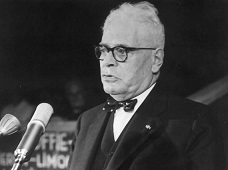Biography P.J. Oud (1886-1968)
Pieter Oud occupies a unique place in Dutch political history. During a political career spanning half a century he was actively involved in the most important events in the Netherlands. Oud was a distinguished Member of Parliament, Minister of Finance during the Great Depression, war-time mayor of Rotterdam, founder and leader of the VVD, parliamentary historian and constitutional law expert. A biography of Pieter Oud will contribute to our knowledge of political history of the Netherlands on (inter)national and local levels. In this biography the research themes liberalism, political representation and governance culture will be explored against the backdrop of the transition of a restricted parliamentary democracy towards a party centered democracy.
Pieter Oud first became a Member of Parliament as an ambitious thirty year old (equal to the legal minimum age), representing the Vrijzinnig Democratische Bond (VDB). This small progressive party took a singular political course during the interwar period, between socialists and conservative liberals. Oud was the financial expert of the VDB. From 1933 to 1937 he was Minister of Finance during two consecutive Colijn cabinets. Side by side, Colijn and Oud carried out controversial austerity and adjustment policies with the ‘gave gulden’ [scatheless guilder] and Gold standard as central pillars. His time in office made Oud a national figure.
In 1938 Oud was appointed as mayor of Rotterdam. After just a few years, the Second World War forced him out of office in 1941. Oud used his newfound status as a private citizen to write a series of books on the parliamentary history of the Netherlands. Following the end of the war, Oud took up his duties as mayor of Rotterdam once again. Now the progressives of the VDB together with the social democrats founded the Partij van de Arbeid (PvdA), the Dutch Labour party. Soon it appeared that for Oud, who did have reservations from the start, there was no political future in the PvdA. His prewar austerity policies made him unpopular with the political left, while Oud kept defending his policies from the past.
In 1948 Oud and the liberal businessman and politician Dirk Stikker founded the Volkspartij voor Vrijheid en Democratie (VVD). During the fifteen years that followed, Oud was party chairman, parliamentary leader and political leader in elections, molding the VVD and Dutch liberalism to his liking. Although opponents condemned his obstinacy, Oud commanded wide admiration due to his inexhaustible work ethic, his phenomenal memory and knowledge. Fellow MP’s considered him to be the constitutional conscience of parliament. Oud inspired a new generation of politicians, among others Hans Wiegel who transformed the VVD into a broad party with mass appeal.
In this biography, Oud is interpreted as a bridging figure between nineteenth-century liberalism and liberalism in its contemporary VVD mold. To what extent did Oud continue the liberal tradition of constitutional thought within the Dutch constitutional framework of 1848? How did he attempt to attract popular support for the liberal principles of the civic upper class he belonged to? In this research project much attention will be paid to Oud’s concepts of representation: what should the bond between voter and representative look like? In contrast to the more dogmatic socialist and confessional parties, Dutch liberalism is characterized by the singular figure of the politician. Therefore biographic research is an excellent method to gain more insight into the development of this political movement. In more general terms, this biography will contribute to our understanding of the formation of modern government in the Netherlands, from the perspective of the prominent statesman Pieter Oud.
The research project will be supervised by prof.dr. G. (Gerrit) Voerman and prof.dr. J.W. (Hans) Renders.
Boris van Haastrecht (1992) is a historian and political scientist. In 2020 he obtained his Master of Arts (research) in History from the University of Amsterdam. He is employed by the University of Groningen since July 2021.
Mail: b.van.haastrecht@rug.nl

